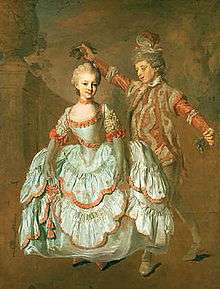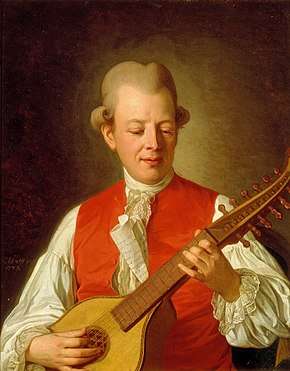Fader Bergström
Fader Bergström, stäm up och klinga (Father Bergström, start playing and sounding) is one of the Swedish poet and performer Carl Michael Bellman's best-known and best-loved songs, from his 1790 collection, Fredman's Epistles, where it is No. 63. The melody is based on a minuet by Carl Envallsson. Bergström was a musician, and the song celebrates dancing and drinking late into the evening.

Context
Carl Michael Bellman is the central figure in Swedish song, known for his 1790 Fredman's Songs and his 1791 Fredman's Epistles. He played the cittern, accompanying himself as he performed his songs at the royal court.[1]
Jean Fredman is a fictional character and the supposed narrator in Bellman's epistles and songs, based on a real watchmaker of Bellman's Stockholm.[2] The epistles paint a picture of the demimonde life of the city during the eighteenth century, where strong drink and beautiful "nymphs" like Ulla Winblad create a rococo picture of life, blending classical allusion and pastoral description with harsh reality.[1][2]
Song
The song is marked "Diktad midt i veckan" (Dictated midweek); it was written in September 1773.[3] The melody is in the key of D major, marked Menuetto (a dance), and in 3
4 time. The rhyming pattern is the shifting ABBBC-DDDC-EEEC-ABAB-CDCD-EEED.[4] The melody was derived from a minuet with the "timbre" label "Minuet af herr Böritz d. ä." in Carl Envallsson's 1788 Bobis bröllop.[3][5][6]
The lyrics have been translated into English by Eva Toller. Bergström was a musician, playing a wind instrument for people's name days in the Katarina Church area of Stockholm,[7] and the song celebrates dancing and drinking late into the evening. The last few lines of Toller's version run:[8]
| Swedish | Translation |
|---|---|
| Väljom nattens sköte under aftonstjärnans klara brand till vårt glada möte, med pokaln i hand; och i mörkrets dvala res Cupidos altar, där du spör, Bacchi källarsvala druvans ångor strör. Lät den dumma i oket tråka och den sluga sin hjärna bråka! Vin och flickor och Fredmans stråka natten ljuvlig gör. | Choose the bosom of the night, below the bright flame of the evening star for our happy gathering, with the goblet in our hands; and in the drowsy darkness, erect the altar of Cupid, where you see (that) the cellar-cool vapours of Bacchus's grapes are spread. Let the dull one be bored in the yoke, and the cunning one exercise his brain! Wine and girls and the fiddle-bow of Fredman make the night delightful. |
Reception
Students of Swedish literature are expected to study Fredman's Songs and Epistles.[9]
Epistle 63 has been recorded by Fred Åkerström on his album Glimmande nymf,[10][11] by Fredrik Berg on his 2014 album Angående Fredrik Bergs tolkning av C M Bellman, where it is the first track,[12] and by Rolf Leanderson on his 2012 album Carl Michael Bellman: Songs & Epistles in Swedish.[13]
References
- "Carl Michael Bellmans liv och verk. En minibiografi (The Life and Works of Carl Michael Bellman. A Short Biography)" (in Swedish). The Bellman Society. Retrieved 25 April 2015.
- Britten Austin, 1967. Pages 61–93, 103–105.
- Massengale, p. 196
- Hassler and Dahl, 1989, page 149
- "N:o 63". Bellman.net. Retrieved 3 June 2019.
- Envallson, Carl (1788). Bobis bröllop, lyrisk comedie uti tre acter [Bobi's Wedding, a lyric comedy in three acts] (in Swedish). Stockholm.
- Hassler and Dahl, 1989, page 15
- Toller, Eva (2009). "FADER BERGSTRÖM, STÄM UPP OCH KLINGA – EPISTEL NR 63 FATHER BERGSTRÖM, START PLAYING – EPISTLE NB 63" (PDF). Eva Toller. Retrieved 3 June 2019.
- "LITTERATURLISTA V15 LV1150 Moment 2: Klassiker ur Sveriges litteratur". Gothenburg University. Archived from the original on 7 March 2016. Retrieved 5 March 2016.
- Hassler, paged 281–282.
- "Fred Åkerström - Fader Bergström (Fredmans epistel nr:63)". YouTube. Retrieved 3 June 2019.
- Berg, Fredrik (9 January 2014). Angående Fredrik Bergs tolkning av C M Bellman. Mr Music.
- Berg, Rolf (1 April 2012). Carl Michael Bellman: Songs & Epistles in Swedish. Bluebell.
Sources
- Bellman, Carl Michael (1790). Fredmans epistlar. Stockholm: By Royal Privilege.
- Britten Austin, Paul. The Life and Songs of Carl Michael Bellman: Genius of the Swedish Rococo. Allhem, Malmö American-Scandinavian Foundation, New York, 1967. ISBN 978-3-932759-00-0
- Britten Austin, Paul. Fredman's Epistles and Songs. Stockholm: Proprius, 1990 and 1999.
- Hassler, Göran; Peter Dahl (illus.) (1989). Bellman – en antologi [Bellman – an anthology]. En bok för alla. ISBN 91-7448-742-6. (contains the most popular Epistles and Songs, in Swedish, with sheet music)
- Hassler, Göran; Peter Dahl (illus.) (1989). Bellman II – en antologi [Bellman – an anthology]. En bok för alla. ISBN 91-7448-837-6.CS1 maint: multiple names: authors list (link) (contains the remaining Epistles and Songs, in Swedish, with sheet music)
- Kleveland, Åse; Svenolov Ehrén (illus.) (1984). Fredmans epistlar & sånger [The songs and epistles of Fredman]. Stockholm: Informationsförlaget. ISBN 91-7736-059-1.CS1 maint: multiple names: authors list (link) (with facsimiles of sheet music from first editions in 1790, 1791)
- Massengale, James Rhea (1979). The Musical-Poetic Method of Carl Michael Bellman. Stockholm: Almqvist & Wiksell International. ISBN 91-554-0849-4.
